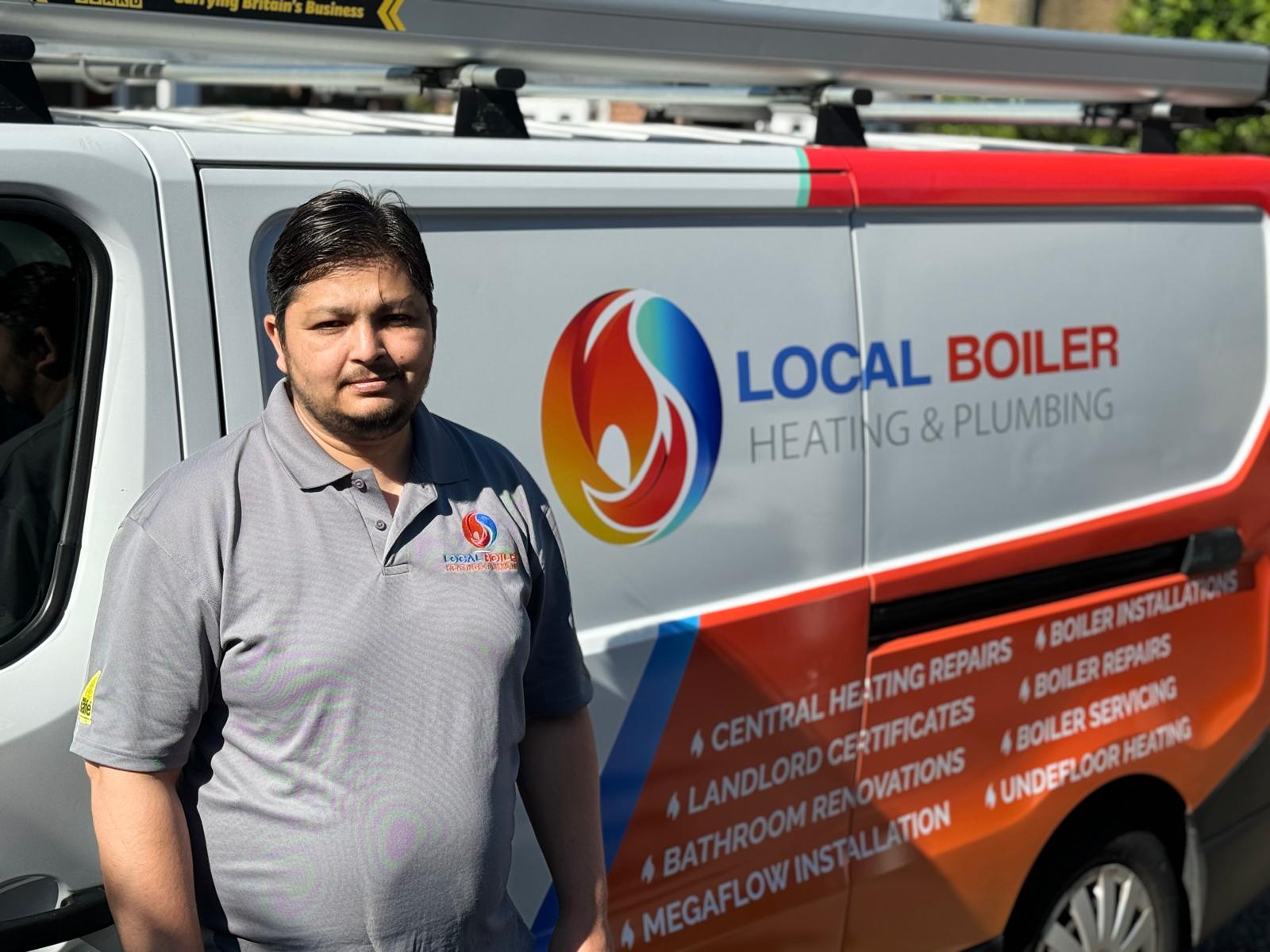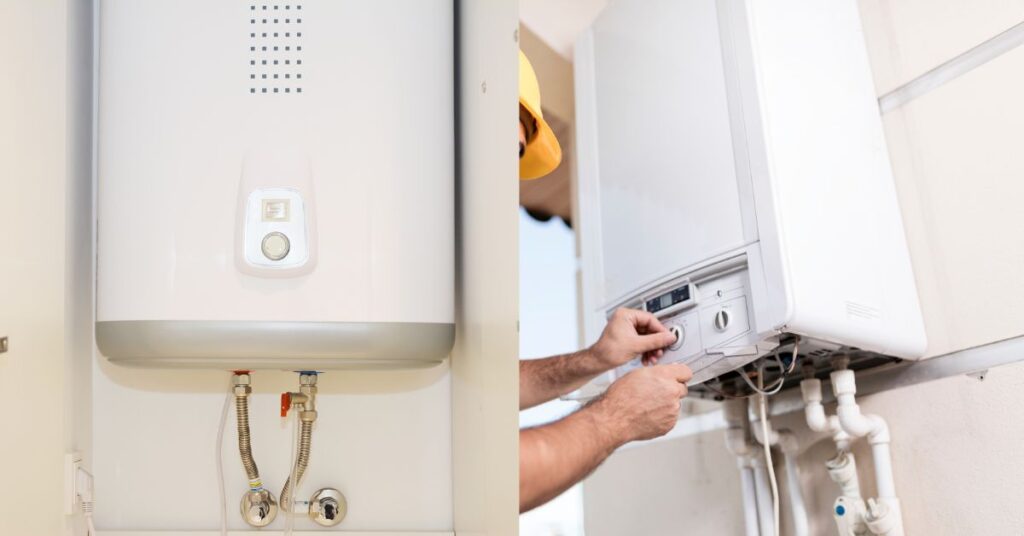It is essential to choose the right boiler for your home. Since it ensures heating and hot water supply to your home, you should choose it carefully. Here, we will discuss two major types of boilers: combi and System Boilers.
- Combi Boiler: Combi boilers are small, condensed units that provide both heating and hot water. They heat water directly, so you do not need a separate hot water cylinder. Combi boilers save energy and are suitable for tiny homes.
- System Boiler: System boilers work with a separate hot water cylinder that provides hot water when needed. They are more suitable for larger homes with higher hot water demands.
Importance of choosing the right boiler for your home:
There are some essential things to keep in mind while selecting a boiler. Pay attention to the capacity of the boiler for your home and according to your needs. Also, the cost of location and installation is essential.
Choosing a suitable boiler helps you save energy, which impacts your bills. Also, by selecting the boiler in advance, you can save on future installation costs. Therefore, choosing the right boiler gives you long-term satisfaction and improves the comfort of your home.
- Efficiency: Energy-efficient boilers ensure optimal energy use, which cuts fuel consumption and utility bills over time.
- Hot Water Demand: Matching the capacity of your boiler with your household’s demand ensures a continuous, uninterrupted water source that won’t compromise performance or comfort.
- Spaces: Space constraints should play a factor when making this choice for your property. Take note of which boiler option fits better within its space constraints—a combi or system boiler.
- Installation Cost: Selecting an ideal boiler can save time and money on future installation or retrofit costs.
- Long-Term Satisfaction: Selecting an efficient boiler adds comfort and convenience to your home environment, improving your overall quality of life and satisfaction with the heating system’s performance.
Also Read: – Boiler Repairs in London
Understanding Combi Boilers:
Combi boilers are central heating systems that combine heating and hot water provision into one compact device, creating warmth and hot water for use throughout a household. Their efficient design enables easy home installation while helping save energy costs over time.
How Combi Boilers Work:
- Heating: When the central heating system is turned on, the combi boiler first heats water from the main supply before dispensing heat through radiators in the home.
- Hot Water: When hot water is needed immediately, a combi boiler quickly heats the main supply before sending it directly to your tap – offering instantaneous access for immediate use.
Benefits of Combi Boiler: For Space Saving Applications.
- Space-saving: Combi boilers provide space-saving heating solutions in homes with tight space.
- Energy-Efficient Boilers: These boilers can save more energy as they only heat hot water when needed, saving electricity and money in heating costs.
- Hot water: Combi boilers deliver instant hot water, eliminating the need for storage tanks and waiting periods for warm water.
- Cost-Effective: These have low installation costs as they do not need additional storage cylinders.
Contras of combi boiler:
- Limited Hot Water Output: Combi boilers may struggle when heating large homes with multiple bathroom fixtures or needing large volumes of hot water at once.
- Dependence on Pressure: A combi boiler’s performance may change according to individual circumstances because it is dependent upon mains water pressure.
- Not compatible with power showers: Unfortunately, these do not fit within the power or high-pressure shower systems and cannot be utilized with them.
Combi boilers are suitable for:
- Small to medium-sized homes: Combi boilers are ideal for properties with one to two bathrooms and moderate hot water demands.
- Apartments and Flats: Due to their space-saving design, combi boilers are generally installed in apartments and flats with limited space.
- Properties with limited storage space: Homes that do not have enough space for a hot water cylinder or tank can benefit from a combi boiler’s compact nature.
Understanding System Boilers
System boilers (sometimes called sealed system boilers) heat water and store it on a board until needed for a tap, shower, or domestic use. Here is a more detailed description:
How Do System Boilers Work?
- Heating process: System boilers generate hot water using a central heating system that burns gas or oil and provides heat to all house corners through radiators or underfloor heating systems that heat every corner.
- Hot water storage: The system boiler requires another hot water cylinder that stores hot water until needed for tap, shower, or any other domestic use.
- Sealed System: System boilers use a sealed or sealed system design. In other words, these pressurized boilers do not require an external tank to store cold water; instead, they draw water directly from the main supply, which is then used for heating and hot water.
- Indirect heating: System boilers use indirect heating methods, such as coils or heat exchangers, for their hot water cylinders to maximize energy efficiency, guarantee that hot water is always available in the home, and conserve water. The cylinders can be heated rapidly.
System boilers bring many advantages:
- Hot Water provision: System boilers offer reliable hot water supplies to multiple faucets and showerheads simultaneously, making them the ideal solution for homes with higher hot water demands.
- Save space: System boilers eliminate the need for an additional chilled water tank on your rooftop – perfect for homes with limited rooftop space!
- Energy Efficiency: System boilers equipped with modern heating controls and thermostats can achieve outstanding energy efficiency, conserving resources while remaining extremely energy-efficient.
Side effects of system boilers:
- Installation Process for System Boilers: Configuring a system boiler requires more time, space, and expertise than installing a combi boiler.
- Requirement of Hot Water Cylinders: Because they require hot water cylinders, system boilers may not be an appropriate choice in properties where space is minimal, or installation would prove too inconvenient for residents.
House types compatible with system boilers:
System boilers are ideal for homes with multiple bathrooms and high hot water needs; providing constant access for multiple bathroom users requires consistent hot water delivery, which is crucial in such properties.
- Home with high hot water needs: Households that regularly require large volumes of hot water may find installing a system boiler beneficial in providing ample supplies of this essential resource.
- Homes ideal for installing hot water cylinder systems: Homes with sufficient room to install hot water cylinder systems, such as airing cupboards or utility rooms, may be an excellent place to install them.
Comparison of Efficiency of Combi vs. System Boilers”
Efficiency is a significant factor when comparing combi and system boilers, so here is an in-depth examination of each form of efficiency as well as what factors affect it:
Combi Boiler Efficiency:
- Space Heating Efficiency: Combi boilers are highly effective space heaters because they can heat water on demand, eliminating stored hot water loss. This saves both energy and money – especially important in small homes where heating demands may be particularly great.
- Hot Water Efficiency: Combi boilers offer instantaneous hot water that can be extremely cost-efficient when properly utilized; however, their efficiency may be affected by factors like flow rate or required temperature rise—more frequent flow or larger temperature differences could slightly reduce efficiency.
- Installation Efficiency: Combi boilers often offer easy installations, which contributes to their effectiveness. However, their proper size and installation must be followed through to maximize performance.
System Boiler Efficiency:
- Space Heating Efficiency: System boilers can also be highly effective space heaters. Like traditional boilers, system boilers circulate hot water through radiators or underfloor heating systems similar to conventional models – their effectiveness ultimately depends on design considerations such as combustion efficiency and proper installation.
- Heating Efficiency: System boilers offer continuous hot water supplies to multiple taps simultaneously in households with high hot water demands, particularly insulation of hot water cylinders and proper distribution of heat from the boiler to the stored water tank, which is emphasized with efficiency in mind.
- Heat Loss: System boilers may experience heat loss from an uninsulated or poorly located hot water cylinder, leading to lower overall efficiency of their boiler system. By offering better insulation or installation practices for these hot water cylinders, system boilers may experience less of this loss and thus be more energy-efficient overall.
Factors Affecting Efficiency:
- Boiler size: For efficient heating and hot water services in any property, combi and system boilers must be appropriately sized to meet their heating and hot water demands. Smaller-sized boilers tend to meet these more efficiently. At the same time, larger models might switch on and off more often, reducing efficiency.
- Insulation and Heat Loss: Proper insulation of heating system components such as pipes, cylinders, and boilers is vital to their effectiveness. It should minimize heat loss to maximize the efficient utilization of generated heat. Insulating heating system components will significantly cut back heat loss while ensuring that every bit of energy produced by them can be utilized effectively.
- Water Quality: Poor or hard water can accumulate scale in a boiler over time, reducing its efficiency and decreasing performance. Regular maintenance and water treatment services can help extend its lifespan while increasing efficiency.
- Control Systems: Modern control systems such as programmable thermostats and zoning controls can maximize boiler operation while increasing overall efficiency by only delivering heating or hot water when necessary.
Cost Comparison
When choosing between combi boilers and system boilers, cost is a significant factor influencing the decision-making process. Let’s delve into the cost comparison between these two types of boilers:
Cost is the main element when choosing between a combi boiler and a system boiler. Here, we will make a cost comparison between these two types of boilers:
Initial setup cost:
Combi Boilers: In general, combi boilers’ initial installation cost is lower than system boilers. Combi boilers do not require additional components such as hot water cylinders or tanks, reducing labor costs and materials.
System Boilers: On the other hand, system boilers generally have a higher initial installation cost because they require additional components such as hot water cylinders and expansion tanks. Additionally, its setup process requires additional pipework installation work.
Long Term Operating Cost:
Energy efficiency rating: Combi boilers and system boilers have energy efficiency ratings, indicating how effectively they use the fuel used to generate hot water.
Fuel consumption: Combi boilers may consume less fuel in smaller homes, while system boilers may be more profitable in larger homes with higher hot water requirements.
Potential savings on energy bills over time:
Combi boilers can provide immediate savings in tiny homes due to lower installation costs and fuel consumption. System boilers offer distinct benefits in larger homes with high hot water demand. They can prove more cost-effective in the long term when integrated with renewable sources such as solar heating systems.
You should select the type of boiler based on your home’s specific needs, budget, and long-term energy savings goals.
Installation Process: Combi vs. System Boilers
Understanding the installation process is crucial when installing boilers, whether combi or system. Here’s an overview of what to expect:
Installation Overview for Combi Boilers:
When installing a combi boiler, the process typically involves:
- Mounting it on the wall.
- Connecting it to the water mains.
- Integrating it with the heating system components.
This method is often more straightforward, as these units do not require additional components such as a hot water cylinder or expansion tank to complete the installation procedures.
System Boiler:
Installing system boilers requires more components, including a hot water cylinder and expansion tank, which must be integrated into your heating system compared to combi models. This requires more involved installation work than their counterparts.
Hiring Qualified Professionals for Boiler Installation:
For optimal safety and efficiency during boiler installation, hiring qualified professionals is critical to its success. Experienced technicians understand all the nuances involved, such as proper size, placement, and connection to the existing heating system – attempting a DIY install yourself or hiring inexperienced individuals may fail. Such miscalculations can potentially lead to both money and safety risks!
Timeline and disruption for combi boilers:
Due to their more straightforward installation process, combi boiler installation usually requires less time than system boiler installation. The exact timeline depends on several variables, including the complexity of the existing heating system and installation location. Homeowners should expect minimal disruption during installation, as combi boilers require fewer additional components than their counterparts.
Comparing Maintenance and Servicing: Combi vs. System Boilers
Regular maintenance is essential for the smooth functioning of both combi and system boilers. Here’s an overview of the maintenance requirements for each type:
Combi Boiler:
Due to their simple design, combi boilers generally require less maintenance. However, regular checks are still essential to ensure they work efficiently—such as inspecting for leaks, checking pressure levels, and regularly cleaning the filters.
System Boiler:
System boilers may require additional components such as cylinders and expansion tanks, which may need servicing more frequently than conventional boilers, including radiators and pipes, to avoid corrosion issues or blockages that may develop over time. Regular inspection is essential to prevent problems like rust and blockages that may develop over time.
Importance of Annual Servicing:
Annual servicing by a specialist technician is highly recommended to ensure all types of boilers operate safely and efficiently, with various components inspected and cleaned where necessary and potential issues resolved before they worsen. Is identified.
Comparing maintenance costs and frequencies:
Combi boilers generally have lower maintenance costs than system boilers due to fewer components and simpler designs. However, system boilers may require more frequent servicing due to being complex systems with many parts.
Regular boiler maintenance and servicing ensures its longevity, efficiency, and, more importantly, safety.
Conclusion
Choosing the correct boiler for your home is essential to ensure efficient heating and hot water supply. Combi boilers offer simplicity and lower maintenance requirements, making them ideal for smaller homes. On the other hand, system boilers are suitable for more significant properties with higher hot water demands but may require more maintenance due to additional components. Regardless of the type, annual servicing by a qualified technician is crucial to maintain efficiency and safety. Regular maintenance helps prolong the boiler’s lifespan, reduces operating costs, and ensures a comfortable living environment.

Sunny Saini is a certified heating engineer with over 15 years of experience in maintaining and repairing boilers. He specializes in diagnosing complex boiler issues and providing reliable solutions to ensure homeowners stay warm and comfortable throughout the year.





![]=](https://localboiler.co.uk/wp-content/uploads/2024/05/Untitled-design-96-300x300.jpg)